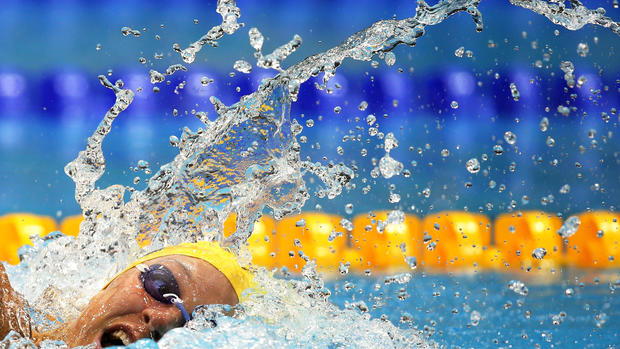Olympic doping flap after China swimmer's win
(CBS News) LONDON - What would an Olympics be without a doping controversy?
It seems we've got one now for London 2012. It involves a Chinese swimmer who won an event with results that seemed, to some, to be too good to be true.
It wasn't just that Ye Shiwen won - it's how she won.
The 16-year-old was fast - too fast according to some. Her final leg in the 400 meter individual medley was quicker than the winning men's time by U.S. swimmer Ryan Lochte.
One of the most respected swimming coaches in the business, American John Leonard, executive director of the World Swimming Coaches Association, was quoted as saying, "Every time we see something unbelievable, history shows us that it turns out there was doping involved."
Ye credited Chinese training methods.
It's an old argument.
Complete coverage of 2012 London Olympics
Olympics photo galleries
The London Games have set up the most exhaustive drug testing program ever. All medal winners will be tested for 240 banned substances, but the dopers - if that's what they are - always seem to be a step ahead of the doping police.
While controversy swirled around the pool, there was some American success inside it.
Teen Missy Franklin won gold in the 100 meter backstroke.
And with her parents cheering from poolside, Franklin is looking like the future of U.S. swimming.
"Just seeing my parents, it means the world that they could be here," she said. "And I know that God has given me so much, and for them to be here and for them to watch it and be with me and experience it is so special."
It was an American one-two, with Matt Grevers and Nick Thoman winning gold and silver in the men's 100 meter backstroke.
But it was a bust in gymnastics, where the U.S. team, which had qualified first, finished a disappointing fifth in the finals. The team event was won by - guess who - the Chinese.
In another controversial note, some American athletes have been complaining about not being able to promote their own sponsors because of an Olympic rule that only official games sponsors can be showcased here.
"The Olympic ideal and the Olympic reality are now different," complained U.S. Olympic sprinter Sonya Richards-Ross.
The Olympics used to be about amateurism. At least, that was the ideal. Now, it appears to be about competing sponsorships.
In the latest medals count: The U.S. and China are tied for the lead with 17 overall, followed by Japan, with 11, followed by Italy and France. China has the most gold medals, with nine. The U.S. has won five golds.


